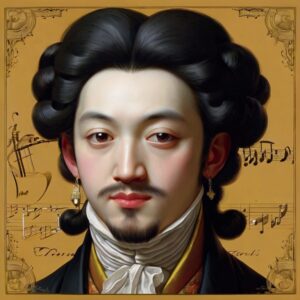Classical music is a vibrant tapestry from the threads of creative genius across different countries and epochs. Each region adds its unique color, reflecting the rich cultural identity and historical nuances of its people.
The Italian Maestros
When you think of Italian classical music, the opera inevitably strikes a chord. Italy is the cradle of opera, with its inception during the late 16th century in an effort to recapture the dramatic arts of ancient Greece. Italian opera is characterized by its emphasis on the human voice, with a particular focus on bel canto, a style that highlights the purity and agility of the singer’s voice. This tradition showcases an unmatched ability to convey the depths of human emotion through vocal prowess.
Composers like Giuseppe Verdi and Gioachino Rossini have gifted the world with operas that are lavish in melodic richness and emotional intensity. Italian composers also excel in instrumental music, but they always carry a lyrical, almost vocal quality to their melodies. The Italian approach to music is one of direct emotional appeal, often prioritizing heart-stirring melody over complex harmony or form.
Germany
Crossing the Alps into Germany, we enter a realm where music is a construct of deep philosophical thought and structural perfection. German classical music is often seen as the backbone of Western classical tradition, with figures like Johann Sebastian Bach, Ludwig van Beethoven, and Johannes Brahms pushing the boundaries of musical form and harmony.
German music is renowned for its architectural precision. Bach’s fugues, for instance, are marvels of musical engineering, weaving intricate lines into a harmonious whole. Beethoven, expanded the scale and expressive scope of symphonic writing, using it as a vehicle for personal and philosophical expression. The Germanic tradition values thematic development and the use of motifs, leading to music that rewards deep and attentive listening.
Russian Soul
Venturing further east, Russian classical music offers a window into the soul of its people. The late 19th and early 20th centuries marked the golden age of Russian classical music, with composers like Pyotr Ilyich Tchaikovsky, Sergei Rachmaninoff, and Igor Stravinsky. Russian music often reflects the vastness of the country’s landscapes and the depth of its people’s souls. It is imbued with a sense of epic grandeur, lush harmonies, and intense emotional depth.
Tchaikovsky’s ballets, for instance, combine memorable melodies with rich orchestration and intense drama. Russian composers are masters at painting with sound, using the orchestra to conjure vivid atmospheric and emotional landscapes. Their music can shift from the delicately lyrical to the wildly tempestuous, mirroring the turbulent history and passionate spirit of Russia.
French Elegance and Color

The influence of French composers like Claude Debussy and Maurice Ravel on the classical music scene cannot be overstated. These maestros, with their pioneering spirit, ventured beyond the constraints of traditional harmonic structures to forge new pathways in musical expression. Their compositions are imbued with a profound appreciation for visual art, nature, and literature, serving as a conduit for translating these elements into auditory experiences. Debussy and Ravel’s works embody the essence of impressionism in music, a movement that prioritizes the evocation of mood and atmosphere over straightforward narrative. This approach marks a significant departure from the more direct and thematic orientations of their predecessors, inviting listeners into a world where soundscapes are painted with a palette of musical colors and textures. The utilization of instrumentation in their compositions is nothing short of revolutionary, as they experiment with combinations and techniques to elicit novel sounds that captivate the imagination. This nuanced and delicate manipulation of musical elements enables their compositions to shimmer and dance, engaging the senses in a way that is both subtle and profound. The legacy of these French composers is a testament to the power of music to convey the ineffable, to create a bridge between the tangible and the abstract, and to enrich the human experience with layers of beauty and meaning that resonate beyond the confines of time and tradition.
The English Pastoral Tradition
The pastoral tradition within English classical music, particularly evident in the works of composers such as Ralph Vaughan Williams and Edward Elgar, stands as a poignant reflection of England’s rich cultural tapestry. This tradition, thriving during periods like the Renaissance and experiencing a resurgence in the 20th century, finds its foundation in a profound appreciation for the natural beauty of the English countryside, its folk traditions, and the historical narratives embedded within the landscape. Through this lens, these composers crafted works that do more than simply evoke a sense of place; they weave a complex emotional tapestry that speaks to a collective yearning for an idealized past and a simpler, more harmonious way of life. The musical language of this tradition is marked by modal melodies that hark back to ancient times, rich and lush harmonies that paint the English landscape in vibrant tonal colors, and a nostalgic charm that gently beckons the listener into a world of pastoral tranquility. This approach to composition reflects a connection to the land and its history and idealized vision of England’s pastoral identity. It is a tradition that eschews the grandiosity and complexity often found in classical music, opting instead for a path of enchantment through melodic beauty and sincerity. The pastoral works of Vaughan Williams, Elgar, and their contemporaries stand as a testament to the enduring power of music to capture and convey the essence of a place and time, inviting listeners to explore the depths of their own connections to the landscapes and histories that shape us.
Reflecting Cultures Through Sound
As we’ve journeyed through these diverse musical landscapes, it’s clear that each country’s classical music reflects its cultural identity and historical context. Italian opera bursts with the same passion found in its people’s love for life. German music, with its complex structures, mirrors a society that values depth and intellectualism. Russian compositions convey the intense emotion and grandeur of the Russian soul. French music captures the elegance, beauty, and artistry that Paris is renowned for. And English compositions evoke the pastoral peace of the English countryside.
Classical music, in its many national forms, tells the stories of its people, their struggles, their joys, and their deepest yearnings. It’s a reminder that while music is a universal language, it also speaks with a distinct accent in each corner of the world, shaped by the unique histories, landscapes, and philosophies of its creators.
